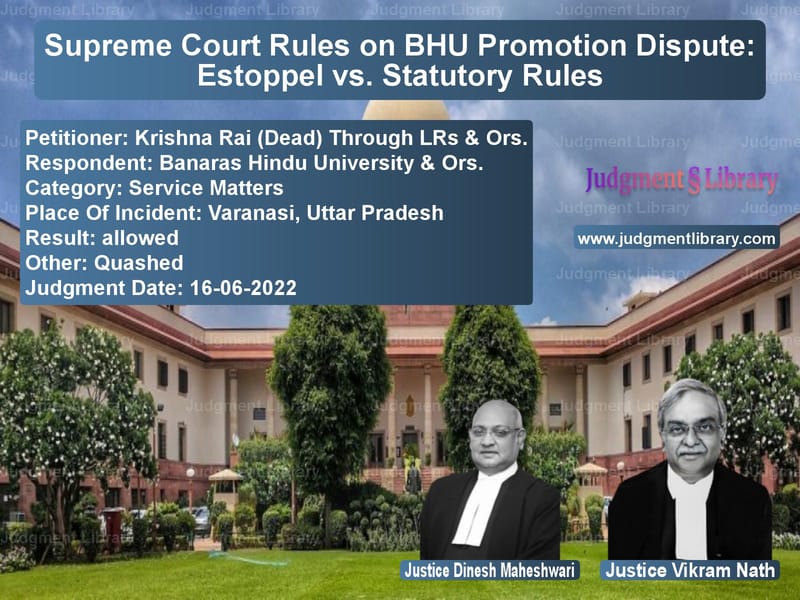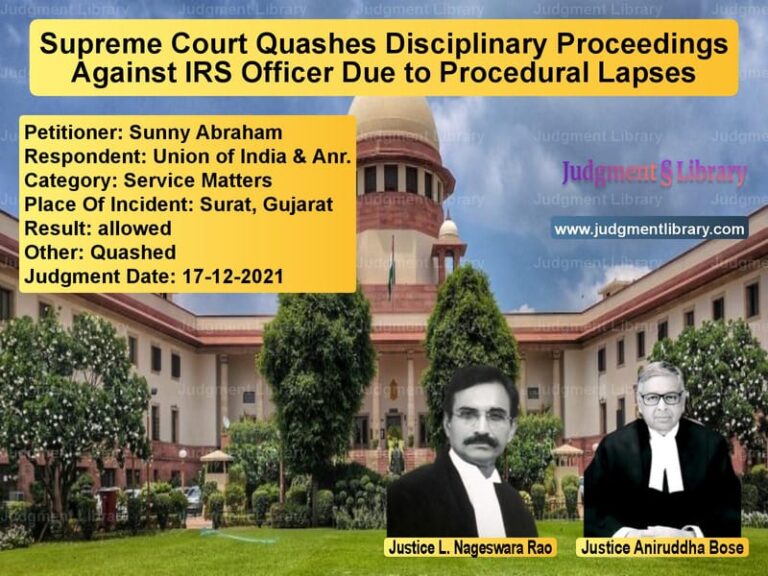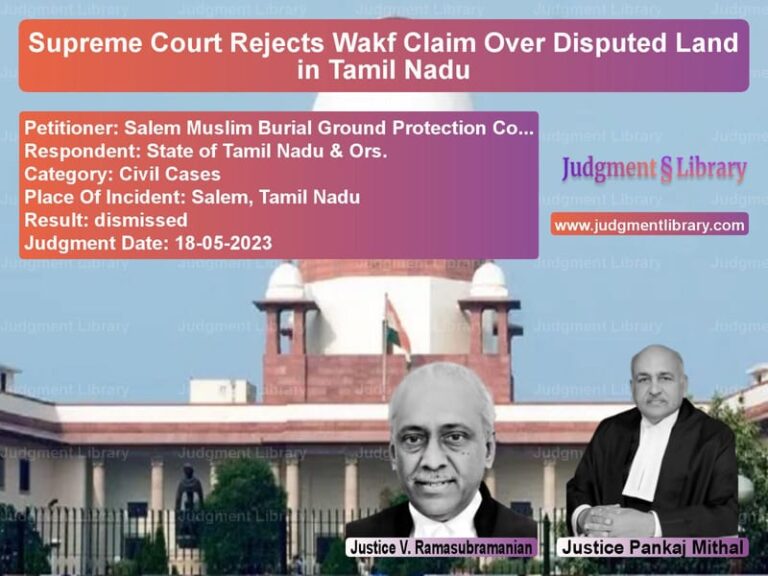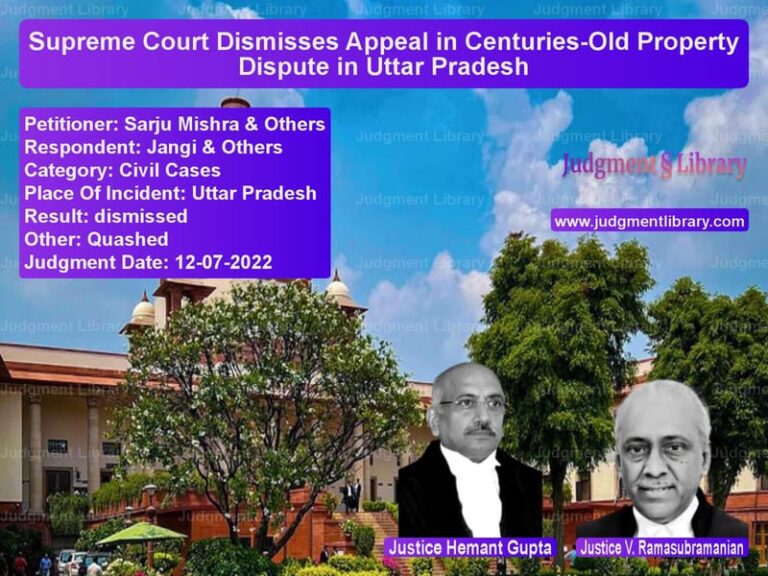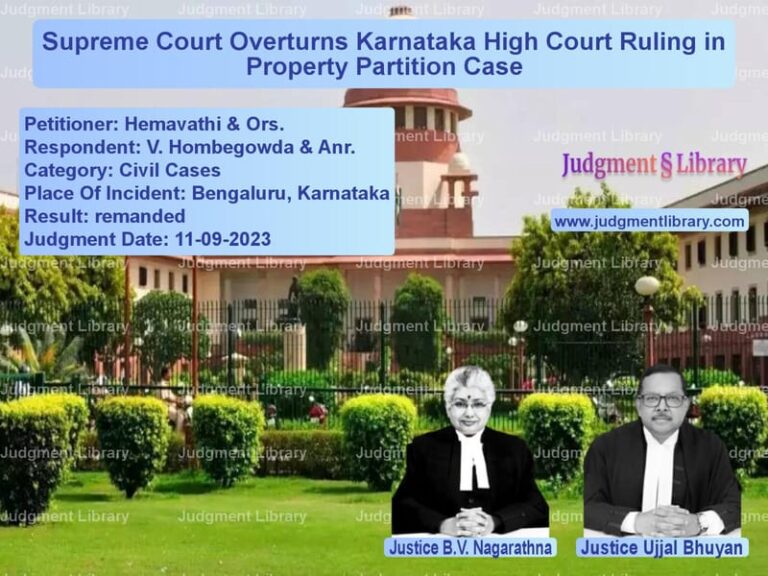Supreme Court Rules on BHU Promotion Dispute: Estoppel vs. Statutory Rules
The Supreme Court recently delivered an important ruling in Krishna Rai (Dead) Through LRs & Ors. v. Banaras Hindu University & Ors., addressing the principle of estoppel and acquiescence versus statutory service rules in promotions. The case concerned the promotion of Class-IV employees to Class-III positions at Banaras Hindu University (BHU). The Court ruled that statutory rules must be strictly adhered to and cannot be overridden by estoppel or acquiescence.
Background of the Case
The dispute arose from a notification dated 17.12.2005, inviting applications from permanent Class-IV employees for promotion to Junior Clerk positions under the 25% promotion quota. The eligibility criteria included:
- Completion of five years of service as a Class-IV employee.
- A matriculation certificate or equivalent qualification.
- A typing test in English or Hindi at 30 words per minute, with a provision allowing promotion subject to passing the test within two years.
- Written tests in simple English, Hindi, and Arithmetic.
However, the selection process was later altered by the Board of Examiners, introducing additional evaluation criteria:
- 20 marks for the typing test.
- 60 marks for the written test.
- 20 marks for an interview, which was not originally required.
The final selection list was prepared based on these criteria, and 14 candidates were appointed as Junior Clerks. Several unsuccessful candidates challenged the selection process.
Arguments Before the High Court
Petitioners’ (Appellants’) Arguments
The unsuccessful candidates challenged the appointment process, arguing that:
- The Board of Examiners had no authority to change the selection criteria.
- The interview was introduced arbitrarily, violating the existing statutory rules.
- The selection criteria were unfair and disadvantaged long-serving employees.
- Estoppel could not apply because they participated under protest.
Respondents’ Arguments
The BHU administration and selected candidates defended the process, stating that:
- The candidates had voluntarily participated in the selection process and could not challenge it after being unsuccessful.
- The changes in the selection process were made to ensure fairness and assess overall competency.
- The High Court should not interfere in service matters unless a clear violation of law occurred.
High Court Judgment
The Single Judge of the High Court ruled in favor of the petitioners, stating:
“Rules of the game cannot be changed during the game. The Board of Examiners had no authority to alter the eligibility criteria and introduce an interview.”
The High Court quashed the selection process and ordered fresh promotions strictly in accordance with the statutory rules.
However, the Division Bench of the High Court overturned this decision, ruling that the appellants were estopped from challenging the process since they had participated without protest.
Supreme Court’s Observations
The Supreme Court rejected the Division Bench’s reasoning and upheld the Single Judge’s decision. The Court ruled:
“Estoppel cannot override statutory rules. The rules governing selection were laid down by the Executive Council of BHU and had to be followed strictly.”
The Court further observed:
- The Board of Examiners exceeded its authority by introducing an interview.
- Selection must be based on statutory rules and not discretionary criteria.
- The principle of estoppel cannot be applied when legal rights are at stake.
- Employees who participated did so under administrative compulsion, not voluntarily.
Final Judgment
The Supreme Court ruled:
- The appeal was allowed.
- The Division Bench’s judgment was set aside, and the Single Judge’s ruling was restored.
- Fresh promotions were ordered to be conducted strictly as per the statutory rules.
- Eligible employees were entitled to consequential benefits, including arrears.
Conclusion
This judgment upholds the principle that statutory service rules prevail over administrative discretion. The Court reinforced that fairness in selection processes is paramount and that no authority can arbitrarily change eligibility criteria to suit its convenience.
The ruling is significant for government employees and public sector institutions, ensuring that promotions and selections adhere strictly to established rules.
Petitioner Name: Krishna Rai (Dead) Through LRs & Ors..Respondent Name: Banaras Hindu University & Ors..Judgment By: Justice Dinesh Maheshwari, Justice Vikram Nath.Place Of Incident: Varanasi, Uttar Pradesh.Judgment Date: 16-06-2022.
Don’t miss out on the full details! Download the complete judgment in PDF format below and gain valuable insights instantly!
Download Judgment: krishna-rai-(dead)-t-vs-banaras-hindu-univer-supreme-court-of-india-judgment-dated-16-06-2022.pdf
Directly Download Judgment: Directly download this Judgment
See all petitions in Promotion Cases
See all petitions in Recruitment Policies
See all petitions in Public Sector Employees
See all petitions in Judgment by Dinesh Maheshwari
See all petitions in Judgment by Vikram Nath
See all petitions in allowed
See all petitions in Quashed
See all petitions in supreme court of India judgments June 2022
See all petitions in 2022 judgments
See all posts in Service Matters Category
See all allowed petitions in Service Matters Category
See all Dismissed petitions in Service Matters Category
See all partially allowed petitions in Service Matters Category

